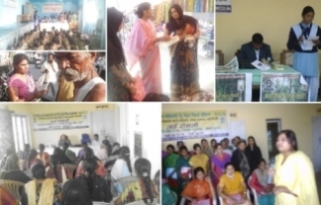SEVAK
Samaj Kalyan Evam Vikas Adhyayan Kendra
Women Rights and VAW
Violence against women infringes her rights as an individual. It is perpetrated on women both inside and outside her home. Domestic violence comprises all acts of intimidation and aggression which forces a woman to seek redressal by breaking the silence imposed on her by a patriarchal culture.
Minimally construed as the physical, mental, emotional and sexual abuse of a woman in her intimate relationship, such violence in the Indian context includes intimidating acts by the members (both men and women) of her marital family. Often condoned by culture, such systemic violence enforces gender inequality by curtailing a woman's freedom and right to self-determination. In turn, the climate for violence is created by the prevailing disparities (on the basis of his/her gender) in an individual's entitlements to the family and community resources. Here the focus on marital violence is not to negate the existence of gender violence or inequalities in parental home.
On the other hand violence against women takes place in shape of eve teasing, rape, murder (after rape it is quite common), trafficking, etc., both at their place of work and outside it. While data on the first three are difficult to find at the all India level because 'law and order' is a state subject, considerable data is available on trafficking. According to a report, between 5,000 and 7,000 girls are trafficked, from their most deprived living environments to exploitative physical and social situations, into India from Nepal, most of them under 18. Girls as young as 13 are trafficked from Asia as mail order brides. In addition girls are trafficked to India from Bangladesh and from poorer states to more affluent ones. The popular routes are from Nepal to Indian states of Uttarakhand, Uttar Pradesh, Bihar and West Bengal, and from Bangladesh to Indian state of West Bengal. They are powerless to protest, thus at risk of violence. Below 18 years girls marriage is also a major social issue mostly in socially backward families.
Lastly, in cases of widespread violence, like communal violence, women are worst sufferers. Even if they are not physically harmed during such violence, they go through considerable trauma because their family members are killed and harmed and their property damaged, ransacked and set afire.
Seeing these limits, the government has started concept of Family Counselling Centres (FCCs). The FCCs are supported by the Central Social Welfare Board, New Delhi, and in addition organization started a Pilot project to minimise the women crime with District Police in Pilibhit. Innovative efforts were appreciated by I.G. Police & S.P. Pilibhit from 2002 to 2005, NGO made availability of veteran women qualified trained counsellors, psychologist & volunteers for women empowerment and family disputes redressal work. Complaints of family disputes and atrocities on women addressed to SP are being tackled through the forum of Sulah Samjhauta under FCC. Remarkable success has been recorded as annual crime rates against women have minimised by up to 40 per cent in cases of dowry, dowry deaths and other forms of atrocities and Central Board FCC working was follow-up of such cases for happy married & joint family norms of our Indian family and socially such a Pilot project was appreciated by regional Police officers of Govt. NGO is still working with Family Counselling Centre giving the free legal aid & counselling services in disputed relation in family affairs also a helpline for free legal aid to support NALSA.
